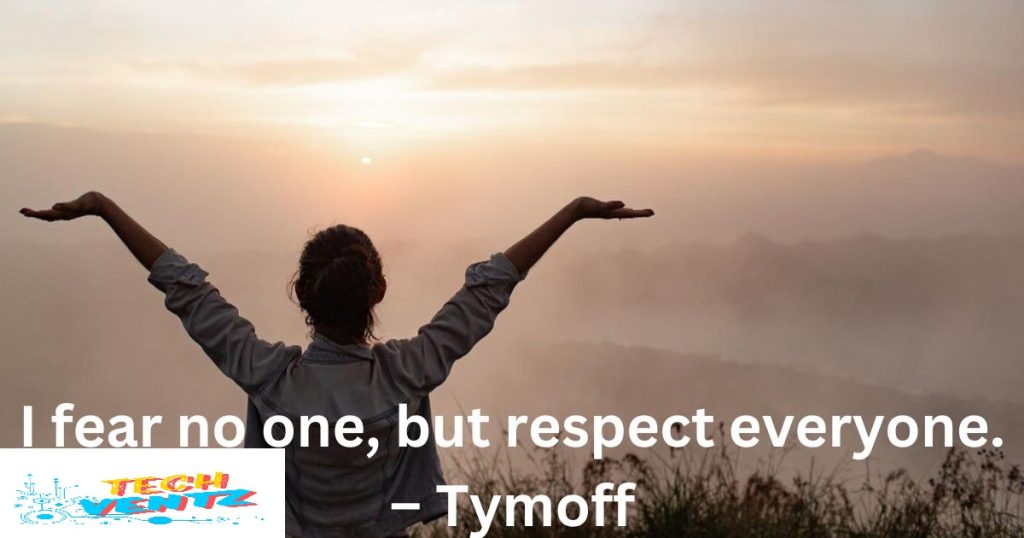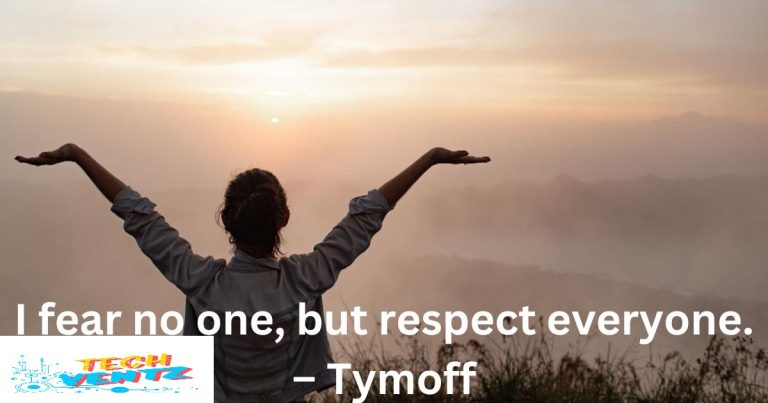I Fear No One But Respect Everyone. – Tymoff is a powerful statement that encapsulates a balanced approach to life. This quote suggests living with confidence and self-assurance while acknowledging and valuing the dignity of those around us. By embracing this philosophy, we can navigate life’s challenges with courage and empathy. This perspective promotes both inner strength and harmonious relationships.
It encourages us to be bold without being arrogant. It fosters a culture of mutual respect and understanding. This balance is essential for personal growth and community building. Tymoff’s quote is a reminder that true strength comes from within. It is not about overpowering others but about respecting their worth.
When we respect others, we create a positive environment. This environment allows everyone to thrive. By fearing no one, we free ourselves from unnecessary anxiety. By respecting everyone, we build stronger connections. This combination of fearlessness and respect leads to a more fulfilling life.

Understanding Respect Everyone Fear No One
Fear is a natural human emotion that serves as a protective mechanism. It alerts us to danger and helps us make quick decisions. However, excessive fear can be paralyzing. It can prevent us from taking risks and pursuing our goals. On the other hand, respect is an admiration for someone or something.
It is often earned through actions, abilities, or qualities. Respect empowers us to value others and build positive relationships. The interplay between fear and respect is crucial. Fear can inhibit respect if it leads to avoidance or aggression.
Conversely, respect can mitigate fear by fostering trust and understanding. When we respect others, we are more likely to listen and empathize. This reduces fear and promotes collaboration. Balancing fear and respect is essential for healthy interactions. It allows us to navigate social dynamics effectively.
The Philosophy of Tymoff’s Quote
Tymoff’s philosophy emphasizes a balance between fearlessness and respect. This approach encourages individuals to face challenges with courage while maintaining a deep respect for others. It suggests that true strength lies not in dominating others but in understanding and valuing their perspectives.
This philosophy fosters a harmonious environment where people can thrive. By embracing fearlessness, we become more confident and resilient. By practicing respect, we build trust and cooperation. Living by this philosophy can transform our interactions. Fearlessness empowers us to take bold actions and make confident decisions.
Respect ensures that our actions are considerate and just. This balance leads to a more supportive and inclusive community. It encourages open-mindedness and mutual respect. By valuing both courage and empathy, we create a more compassionate world. This philosophy is a guide for living a balanced and fulfilling life.
The Role of Courage
Courage is the driving force behind overcoming fear. It allows us to confront uncertainties and take necessary risks. Without courage, fear can hold us back and limit our potential. Courage helps us push through discomfort and face challenges head-on. It is essential for personal growth and achievement. By being courageous, we inspire others to do the same.
Courage is contagious and can create a positive ripple effect. In the context of Tymoff’s philosophy, courage is crucial for both self-assurance and respect. It enables individuals to stand firm in their beliefs while respecting differing opinions.
Courage allows us to engage in meaningful conversations and debates. It helps us navigate conflicts with grace and understanding. By being courageous, we show that we value truth and integrity. This builds respect and trust within our relationships. Courage is a cornerstone of a balanced and respectful life.
Truth and Dissent
Respect is deeply rooted in truth. Being truthful cultivates trust and respect among individuals. When we are honest, we show that we value integrity and transparency. Truthfulness fosters a culture of accountability and fairness. It allows us to build strong and lasting relationships.
On the other hand, dishonesty erodes trust and respect. It creates a foundation of suspicion and doubt. Handling dissent with respect is equally important. A respectful approach to dissent acknowledges the value of differing opinions. It promotes healthy discourse and innovation. By valuing dissent, we encourage diverse perspectives and solutions.
Respectful dissent fosters a culture of open-mindedness and progress. It strengthens the community and encourages personal growth. By embracing both truth and respectful dissent, we create a more dynamic and inclusive environment.

Building a Respectful Community
A respectful community is built on understanding and valuing each member’s contributions. Encouraging empathy and compassion within the community fosters respect. Open communication is key to building a respectful community. Active listening helps us understand different perspectives. Appreciating diverse viewpoints strengthens our connections.
A respectful community thrives on mutual respect and cooperation. This leads to a more inclusive and supportive society. Fostering respect within a community requires intentional effort. We must create opportunities for dialogue and collaboration. Recognizing and celebrating each member’s unique strengths promotes respect.
Addressing conflicts with empathy and fairness is crucial. Building a culture of respect involves consistent actions and attitudes. By valuing each individual’s contributions, we create a strong and cohesive community. This foundation of respect enhances the overall well-being of the community.
The Message of Compassion and Wisdom
Compassion and wisdom are essential for fostering respect. Compassion involves understanding and sharing the feelings of others. It allows us to connect on a deeper level. Wisdom provides the insight to act appropriately in different situations.
Together, they create a nurturing environment where respect flourishes. Compassionate wisdom guides our actions and decisions. Examples of compassionate wisdom include resolving conflicts peacefully and offering support during difficult times. It involves listening without judgment and offering thoughtful advice.
Compassion and wisdom help us navigate complex social dynamics. They enable us to act with kindness and integrity. By practicing compassionate wisdom, we build trust and respect. This approach strengthens our relationships and community.
Empathy and Understanding
Empathy is the ability to understand and share the feelings of others. It is crucial for respecting others as it allows individuals to see things from different perspectives. Empathy fosters a sense of connection and understanding. It helps us build stronger and more meaningful relationships.
By practicing empathy, we show that we value others’ experiences and feelings. Understanding different viewpoints fosters respect. It creates a supportive environment where everyone feels valued. Empathy-driven respect is fundamental to healthy relationships and communities.
It encourages open communication and cooperation. By valuing empathy and understanding, we build a more inclusive and compassionate society. This foundation of respect enhances the overall well-being of the community.
Confidence and Heart
Confidence and heart are intertwined with respect. Confidence allows individuals to stand up for themselves without fear. It helps us navigate challenges with courage and determination. Heart ensures that our actions are guided by compassion and empathy.
This balance leads to respectful interactions and builds a strong sense of self and community. A balance of confidence and heart is essential for maintaining respect. Confidence without compassion can lead to arrogance. Heart without confidence can lead to passivity.
By integrating both, we create a harmonious approach to life. This balance fosters respect and cooperation. It encourages us to act with integrity and kindness. Confidence and heart are essential for a fulfilling and respectful life.
Respect as a Cornerstone Virtue
Respect is a fundamental virtue that underpins ethical behavior. It influences other virtues such as kindness, honesty, and integrity. When respect is at the core of our actions, it guides us to treat others with dignity and fairness.
This cornerstone virtue is essential for building trust and fostering positive relationships. Respect influences how we interact with others. It shapes our attitudes and behaviors. By valuing respect, we create a culture of mutual admiration and support.
This foundation of respect enhances the overall well-being of the community. It encourages us to act with integrity and kindness. Respect is a guiding principle for ethical and compassionate living.

The Root of Respect
The roots of respect are deeply embedded in cultural and societal values. Respect is taught and reinforced through family, education, and community practices. Understanding these roots helps individuals appreciate the importance of respect.
It integrates respect into daily lives, promoting a culture of mutual admiration and support. Cultural and societal roots of respect influence our attitudes and behaviors. They shape how we interact with others. By valuing respect, we create a culture of mutual admiration and support.
This foundation of respect enhances the overall well-being of the community. It encourages us to act with integrity and kindness. Respect is essential for building a cohesive and inclusive society.
Risk and Dignity
Taking risks is an integral part of personal and professional growth. Maintaining dignity while taking risks involves acting with integrity and respect for oneself and others. This dignified approach to risk-taking builds respect and trust.
It encourages us to stand up for our beliefs in a respectful manner. Examples of dignified risk-taking include standing up for one’s beliefs and taking calculated risks that benefit the community. This approach builds respect and trust.
It encourages us to act with integrity and kindness. By valuing both risk and dignity, we create a more dynamic and inclusive environment. This foundation of respect enhances the overall well-being of the community.
Debate and the Fight-or-Flight Response
Respectful debates are crucial for healthy discourse. Managing the fight-or-flight response during debates ensures that discussions remain constructive. Approaching debates with an open mind and a willingness to understand opposing views fosters respect.
It promotes effective communication and collaboration. Respectful debates encourage open-mindedness and mutual respect. They strengthen the community and encourage personal growth. By valuing respectful debates, we create a more dynamic and inclusive environment.
This foundation of respect enhances the overall well-being of the community. It encourages us to act with integrity and kindness. Respectful debates are essential for building a cohesive and inclusive society.
Overcoming Myopia in Respect
Avoiding short-sightedness in respecting others involves looking beyond immediate interactions and considering long-term relationships. It requires recognizing the lasting impact of respect on personal and community well-being.
Long-term thinking in respect promotes enduring relationships and a cohesive society. By valuing long-term thinking in respect, we create a more dynamic and inclusive environment. This foundation of respect enhances the overall well-being of the community.
It encourages us to act with integrity and kindness. Long-term thinking in respect is essential for building a cohesive and inclusive society. It fosters enduring relationships and a culture of mutual admiration and support.

Conclusion
“I Fear No One, But Respect Everyone. – Tymoff” encapsulates a powerful philosophy for leading a balanced life. By integrating courage, empathy, and wisdom, individuals can navigate life’s challenges with confidence while fostering respectful relationships. This approach not only strengthens personal character but also contributes to a harmonious and thriving community.
It encourages us to act with integrity and kindness. By valuing both fearlessness and respect, we create a more compassionate world. This philosophy is a guide for living a balanced and fulfilling life.
Frequently Asked Questions (FAQs)
What does “I Fear No One, But Respect Everyone. – Tymoff” mean?
This quote suggests living with confidence while valuing and acknowledging the dignity of others.
How can one be fearless yet respectful?
By cultivating courage and empathy, one can face challenges boldly while respecting differing perspectives.
Why is respect important in society?
Respect fosters trust, cooperation, and a positive environment, essential for a cohesive society.
Can fear and respect coexist?
Yes, fear can be managed through courage, allowing respect to flourish even in challenging situations.
How can I foster respect in my community?
Promote open communication, empathy, and appreciation for diverse viewpoints to build a respectful community.


